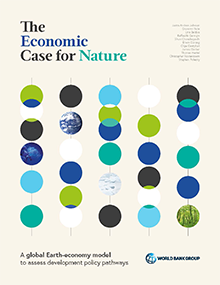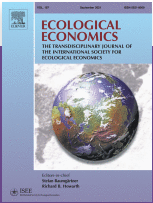Publications
Share your publications with the GLASSNET Community.
Share your research with the GLASSNET Community. To include your publication on our website and newsletter, please visit GLASSNET Publications Forms
Featured Publications

|
The Economic Case for NatureGiovanni Ruta, Justin Andrew Johnson, Uris Baldos, Raffaello Cervigni, Shun Chonabayashi, Erwin Corong, Olga Gavryliuk, James Gerber, Thomas Hertel, Christopher Nootenboom, and Stephen Polasky. The direct impacts of climate change on crop yields and human health are individually well-studied, but the interaction between the two have received little attention. Here we analyze the consequences of global warming for agricultural workers and the crops they cultivate using a global economic model (GTAP) with explicit treatment of the physiological impacts of heat stress on humans' ability to work. |
|
|
Energy matters: Mitigating the impacts of future land expansion will require managing energy and extractive footprintsJustin A. Johnson, Christina M. Kennedy, James R. Oakleaf, Sharon Baruch-Mordo, Stephen Polasky, Joseph Kiesecker Understanding potential future patterns of human-induced land-use and land-cover change is critical to assessing and proactively managing the tradeoffs between development and the environment. Most global land-use change assessments, however, consider a narrow set of economic sectors, focusing primarily on agricultural and urban sectors. We present a global land-use change model that includes detailed energy and mining sectors (11 in total) in addition to agriculture and urban sectors. |

|
Heat stress on agricultural workers exacerbates crop impacts of climate changeCicero Z. Lima, Jonathan R. Buzan, Frances C. Moore, Uris Lantz C. Baldos, Matthew Huber, and Thomas W. Hertel The direct impacts of climate change on crop yields and human health are individually well-studied, but the interaction between the two have received little attention. Here we analyze the consequences of global warming for agricultural workers and the crops they cultivate using a global economic model (GTAP) with explicit treatment of the physiological impacts of heat stress on humans' ability to work. |
Jägermeyr, J., Müller, C., Ruane, A. C., Elliott, J., Balkovic, J., Castillo, O., … Rosenzweig, C. (2021). Climate impacts on global agriculture emerge earlier in new generation of climate and crop models. Nature Food. https://doi.org/10.1038/s43016-021-00400-y
Kanu, E. A. (2014). An Analysis of the Effects of Large Scale Land Acquisition on Rural Livelihoods in Southern Sierra Leone. University of Hohenheim (Unpublished thesis)
Hertel, T., Elouafi, I., Tanticharoen, M. et al. Diversification for enhanced food systems resilience. Nat Food (2021). https://doi.org/10.1038/s43016-021-00403-9
Baylis, Kathy, Thomas Heckelei, and Thomas W Hertel. “Agricultural Trade and Environmental Sustainability.” Annual review of resource economics 13.1 (2021): 379–401. Web.
Teshome H, Tesfaye K, Dechassa N, Tana T, Huber M. Smallholder Farmers’ Perceptions of Climate Change and Adaptation Practices for Maize Production in Eastern Ethiopia. Sustainability. 2021; 13(17):9622. https://doi.org/10.3390/su13179622
Soergel, B., Kriegler, E., Weindl, I. et al. A sustainable development pathway for climate action within the UN 2030 Agenda. Nat. Clim. Chang. 11, 656–664 (2021). https://doi.org/10.1038/s41558-021-01098-3
Banerjee, Onil; Cicowiez, Martin; Macedo, Marcia; Malek, Žiga; Verburg, Peter; Goodwin, Sean; Vargas, Renato; Rattis, Ludmila; Brando, Paulo M.; Coe, Michael T.; Neill, Christopher; Damiani, Octavio. 2021. "An Amazon Tipping Point: The Economic and Environmental Fallout" Inter - American Development Bank Environment, Rural Development and Disaster Risk Management Division. https://publications.iadb.org/en/amazon-tipping-point-economic-and-environmental-fallout
Lima, Cicero Z., Jonathan R. Buzan, Frances C. Moore, Uris Lantz C. Baldos, Matthew Huber, and Thomas W. Hertel. 2021. “Heat Stress on Agricultural Workers Exacerbates Crop Impacts of Climate Change”, Environmental Research Letters 16 044020 https://doi.org/10.1088/1748-9326/abeb9f
Buzan, Jonathan, and Matthew Huber. 2020. “Moist Heat Stress on a Hotter Earth.” Annual Review of Earth and Planetary Sciences 48: 1–30. https://doi.org/10.1146/annurev-earth- 053018-060100.
Hertel, Thomas W., Thales West, Jan Boerner and Nelson Villoria, 2019. “A Review of Global-Local-Global Linkages in Economic Land-use/cover Change Models” Environmental Research Letters 14:1-18, 053003. https://iopscience.iop.org/article/10.1088/1748-9326/ab0d33
Seppelt, Ralf, Channing Arndt, Michael Beckmann, Emily A. Martin, and Thomas W. Hertel. 2020. “Deciphering the Biodiversity–Production Mutualism in the Global Food Security Debate.” Trends in Ecology & Evolution 35(11)1011-1020. https://doi.org/10.1016/j.tree.2020.06.012
Baldos, U.L.C, I. Haqiqi, T.W. Hertel, J.M. Horridge and J. Liu (2020) “SIMPLE-G: A Multiscale Framework for Integration of Economic and Biophysical Determinants of Sustainability”, Environmental Modelling and Software vol. 133(November):1-14. https://doi.org/10.1016/j.envsoft.2020.104805
Hertel, Thomas W., and Cicero Z. de Lima (2020) “Viewpoint: Climate Impacts on Agriculture: Searching for Keys under the Streetlight.” Food Policy, 95(August):1-12, 101954. https://doi.org/10.1016/j.foodpol.2020.101954 .
Lopez-Barrera, E. and T.W. Hertel, (2020) “Global food waste across the income spectrum: Implications for food prices, production and resource use”, Food Policy, 95(March):1-15, 101874 https://doi.org/10.1016/j.foodpol.2020.101874
Birgit Müller, Falk Hoffmann, Thomas Heckelei, Christoph Müller, Thomas W. Hertel, J. Gareth Polhill, Mark van Wijk, Thom Achterbosch, Peter Alexander, Calum Brown, David Kreuer, Frank Ewert, Jiaqi Ge, James D.A. Millington, Ralf Seppelt, Peter H. Verburg, Heidi Webber (2020) “Modelling Food Security: Bridging the Gap between the Micro and the Macro Scale”, Global Environmental Change 63(July):1-15, 102085. https://doi.org/10.1016/j.gloenvcha.2020.102085
Sun, Shanxia, Brayam Valqui Ordonez, Mort D. Webster, Jing Liu, Christopher J. Kucharik, and Thomas Hertel. 2020. “Fine-scale Analysis of the Energy-Land-Water Nexus: Water Quality Implications of Biomass Co-Firing in the Midwestern U.S.”, Environmental Science and Technology 54(4):2122-2132 https://doi.org/10.1021/acs.est.9b07458.
Taheripour, F., T.W. Hertel and N. Ramankutty (2019). “Market-mediated responses confound policies to limit deforestation from oil palm expansion in Malaysia and Indonesia” Proceedings of the National Academy of Sciences 116(38)19193-19199.
Baldos, Uris L.C., Thomas W. Hertel, and Frances Moore, (2019). “Understanding the Spatial Distribution of Welfare Impacts of Global Warming on Agriculture and its Drivers”, American Journal of Agricultural Economics 101(5):1455–1472. https://doi.org/10.1093/ajae/aaz027
Yao, Guolin, Thomas W. Hertel and Farzad Taheripour, 2018. “Economic Drivers of Telecoupling and Terrestrial Carbon Fluxes in the Global Soybean Complex” Global Environmental Change, 50:190-200.
Moore, Frances C., Uris L.C. Baldos, Thomas W. Hertel, and Delavane Diaz, 2017. “New Science of Climate Change Impacts on Agriculture Implies Higher Social Cost of Carbon” Nature Communications, 8(1):1-9, 1607.
Liu, Jing, Thomas W. Hertel, Richard Lammers, Alexander Prusevich, Uris Baldos, Danielle Grogan and Steve Frolking, 2017. “Achieving Sustainable Irrigation Water Withdrawals: Global Impacts on Food Security and Land Use” Environmental Research Letters 12:1-11,.https://doi.org/10.1088/1748-9326/aa88db .
Hertel, T.W. and U.L.C. Baldos. (2016) “Attaining Food and Environmental Security in an Era of Globalization”, Global Environmental Change, 41:195-205.
Liu, J., T.W. Hertel, and F. Taheripour (2016). “Analyzing Water Scarcity in Global CGE Models”, Water Economics and Policy 2(2):1-30.
Hertel, T., W. (2016) “Food Security Under Climate Change”, Nature Climate Change (6):10-13.
Liu, J., H. Mooney, V. Hull, S. Davis, J. Gaskell, T. Hertel, J. Lubcheco, K. Seto, P. Gleick, C. Kremen and S. Li. (2015) “Systems Integration for Global Sustainability”, Science 347(6225): 963-975. This paper won the 2017 outstanding paper award from the Ecological Society of America.
Liu, J., T.W. Hertel, N.S. Diffenbaugh, M.S. Delgado and M. Ashfaq (2015). “Future property damage from flooding: Sensitivities to Economy and Climate Change”, Climatic Change, 132:741–749, DOI 10.1007/s10584-015-1478-z
Baldos, U.L.C. and T. W. Hertel (2015) “The Role of International Trade in Managing Food Security Risks from Climate Change”, Food Security, 7:275-290. http://link.springer.com/article/10.1007/s12571-015-0435-z#page-1
Pelikan, J., Britz, W., and T. W. Hertel (2015). “How Green are Agricultural Set Asides? An Analysis at the Global and Regional Levels”, Journal of Agricultural Economics, 66(1):1-19. https://doi:10.1111/1477-9552.12065
Liu, J., T.W. Hertel, F. Taheripour, T. Zhu and C. Ringler (2014). “International Trade Buffers the Impact of Future Irrigation Shortfalls”, Global Environmental Change 29:22-31.
Verma, M., T. W. Hertel and N.S. Diffenbaugh (2014). “Market-oriented Ethanol and Corn-trade Policies can Reduce Climate-induced US Corn Price Volatility”, Environmental Research Letters 9:1-10, 064028. doi:10.1088/1748-9326/9/6/064028
GLASSNET also recently published a special issue of Environmental Research Letters focusing on global-local-global analysis of sustainability, with 13 individual papers and a synthesis by Hertel, Irwin, Polasky and Ramankutty: https://iopscience.iop.org/article/10.1088/1748-9326/acf8da
Zuidema, Shan, Jing Liu, Maksym G. Chepeliev, David R. Johnson, Uris Lantz C. Baldos, Steve Frolking, Christopher J. Kucharik, Wilfred M. Wollheim, and Thomas W. Hertel. 2023. “US Climate Policy Yields Water Quality Cobenefits in the Mississippi Basin and Gulf of Mexico.” Proceedings of the National Academy of Sciences 120 (43): e2302087120. https://doi.org/10.1073/pnas.2302087120.
Hertel, Thomas W., Elena Irwin, Stephen Polasky, and Navin Ramankutty. 2023. “Focus on Global–Local–Global Analysis of Sustainability.” Environmental Research Letters 18 (10): 100201. https://doi.org/10.1088/1748-9326/acf8da.
Liu, Jing, Laura Bowling, Christopher Kucharik, Sadia Jame, Uris Baldos, Larissa Jarvis, Navin Ramankutty, and Thomas Hertel. 2023. “Tackling Policy Leakage and Targeting Hotspots Could Be Key to Addressing the ‘Wicked’ Challenge of Nutrient Pollution from Corn Production in the U.S.” Environmental Research Letters 18 (10): 105002. https://doi.org/10.1088/1748-9326/acf727.
Lopez-Barrera, E. and T.W. Hertel, (2023) “Solutions to the double burden of malnutrition also generate health and environmental benefits”, Nature Food, (4):616-624. https://doi.org/10.1038/s43016-023-00798-7
Hertel, Thomas W. “Global and Local Policies for Respecting Planetary Boundaries: Tradeoffs and Synergies”, virtual presentation to the workshop on Integrating Planetary Boundaries in Economic and Social Science Analysis, organized by the Department of Economics, University of Copenhagen, September 15, 2023.
Share your publications with GLASSNET
Share your research with the GLASSNET Community. To include your publication on our website and newsletter, please visit GLASSNET Publications Forms

